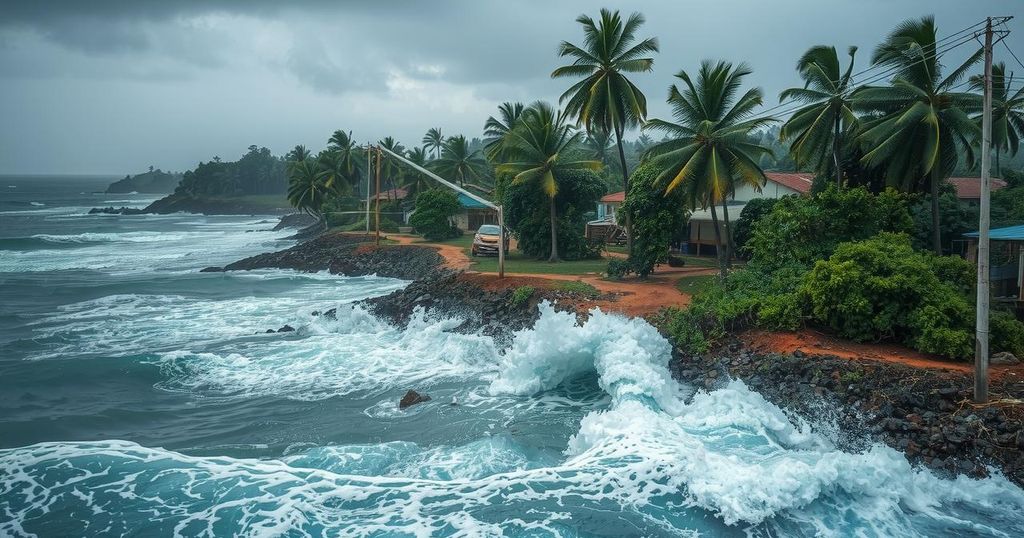Tropical Storm Dikeledi Brings Threatening Conditions to Mozambique

Tropical Storm Dikeledi struck northern Mozambique on Monday, causing devastation after leaving at least three dead in Madagascar. With forecasted rainfall of up to 200 mm and winds up to 180 km/h, authorities have issued flood warnings. President Nyusi has urged residents to seek shelter and prepare adequately. Historical events emphasize the high risks associated with such storms in the region.
Tropical Storm Dikeledi made landfall in northern Mozambique on Monday, following its destructive passage through Madagascar, where it caused at least three fatalities and severe flooding in the French territory of Mayotte. As it approached Mozambique’s Nampula region, the storm brought with it violent winds and heavy rainfall, according to reports from Meteo-France. The country remembers the devastation from Cyclone Chido in December 2021, which resulted in over 120 casualties and significant damage.
In response to the mounting threat, Mozambique’s National Institute of Meteorology (INAM) issued urgent flood warnings, predicting precipitation levels of up to 200 millimeters (approximately eight inches) within a 24-hour period, accompanied by wind gusts reaching 180 kilometers (110 miles) per hour. In an address coinciding with the opening of parliament in the capital city of Maputo, President Filipe Nyusi implored residents in affected regions to take immediate precautions, advising them to seek safe shelter and stockpile food and water in preparation for the storm’s impact.
Dikeledi had previously struck Madagascar, affecting the northern tip of the island with cyclonic conditions marked by strong winds and torrential rains. It is anticipated that the storm may affect Madagascar’s southwest coast again as it continues its southward trajectory later in the week. Notably, cyclones are most frequent in the Indian Ocean between November and March. This season, warmer surface water temperatures nearing 30 degrees Celsius (86 Fahrenheit) are expected to enhance the storm’s intensity, echoing similar patterns of increased storm activity associated with global warming seen in other major oceanic regions.
Cyclones form primarily in the Indian Ocean from November through March, a seasonal occurrence that is closely linked to regional climatic conditions. This year, exceptionally high surface water temperatures have been recorded, further intensifying storm activity. Historical context reveals that earlier storms, such as Cyclone Chido in December, have had devastating effects on Mozambique, leading to substantial loss of life and property. Storms like Dikeledi pose significant risks to vulnerable populations in coastal areas, making accurate early warning systems and government preparedness critical.
In summary, Tropical Storm Dikeledi has presented a serious threat to northern Mozambique, compounded by its previous impact on Madagascar. The government has issued flood warnings and urged affected residents to prioritize their safety. The broader context of increasing storm intensity due to warmer ocean temperatures highlights ongoing concerns related to climate change and its impact on regional weather patterns.
Original Source: www.barrons.com






